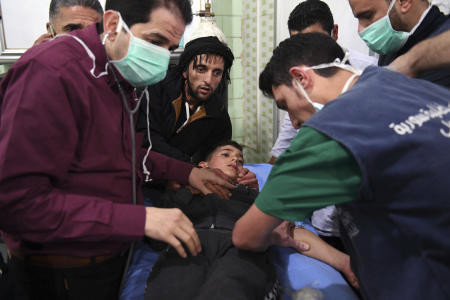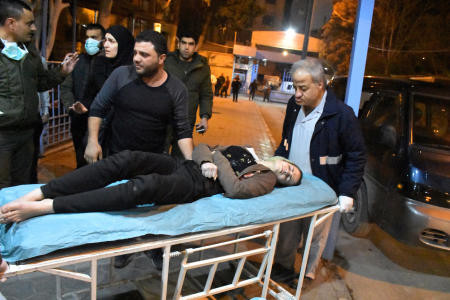DAMASCUS/MOSCOW: Russia on Sunday accused insurgents in Syria of bombarding the city of Aleppo with shells filled with chlorine gas, poisoning 46 people, including eight children it said were being treated in hospital.
Russia’s Ministry of Defense said in a statement the chemical attack had been launched from an area in the Idlib de-escalation zone controlled by Nusra Front militants and that it planned to talk to Turkey about the incident since Ankara was a guarantor of how the armed opposition there upheld a cease-fire.
“According to our preliminary information, confirmed in particular by symptoms of poisoning among the victims, the shells used to bombard residential areas of Aleppo were filled with chlorine (gas)” Russian Maj. Gen. Igor Konashenkov said in the statement.
Syrian's foreign ministry urged the United Nations to take action, calling “the Security Council to immediately and strongly condemn these terrorist crimes ...(and take) deterrent, punitive measures against the nations and regimes that support and fund terrorism."
At least 46 civilians were being treated Saturday, and around 100 reported difficulty in breathing after the attack on the government-held Aleppo city in the country’s north, according to reports in Syrian state media.
Most of those admitted to hospitals had breathing problems and blurred vision, doctors told state TV. One doctor said two were in critical condition, including a child. State TV showed footage of medical professionals treating men and women on hospital beds.
There was a stench of gas in Aleppo city after projectiles were fired, said Rami Abdurrahman, the head of Britain-based Syrian Observatory for Human Rights.
Rebel commanders and opposition figures discredited the government reports, denying they lobbed gas into Aleppo and accusing Damascus of seeking to undermine an existing cease-fire and efforts to kickstart political talks. Earlier Saturday, government shelling of a rebel-held area in neighboring Idlib province killed at least seven civilians.
In Aleppo city, local governor Hussein Diab visited the injured at the hospital. He told state TV that 41 people had been admitted and accused rebels of using poisonous gas in the missiles they lobbed at the Aleppo neighborhood.
Health official Hajj Taha later said the number of injured was up to 50, adding that symptoms suggest the gas used was chlorine. Further tests are needed, he said.
The projectiles landed in the Al-Khalidiya neighborhood, and wind caused gas to spread, Aleppo police chief Essam Al-Shali told state TV. State TV later said the gas affected two other areas in the city. There are no deaths, Al-Shali said.
One patient said a foul smell filled the air after projectiles were lobbed.
“There are often missiles on the city but this is the first time we smelled such a smell,” the patient said without giving his name.
State TV later said government troops retaliated, hitting the source of the attack. It didn’t elaborate.
A cease-fire in Aleppo and Idlib has been fraying in recent days. Aleppo has come under rebel attack in recent weeks, with missiles falling inside the city. The government has responded with counter attacks on rebel-held areas in the Aleppo countryside.
Earlier Saturday, rescue works and the Britain-based Syrian Observatory for Human Rights said government shells landed in Jarjanaz, a rebel-held town in Idlib province, hitting students as they were leaving their school. The shelling killed eight, including six children, according to the civil defense team in the opposition-held area.
The opposition fighters don’t have chemical weapons or the means to lab them, rebel commander Abdel-Salam Abdel-Razek said. On Twitter, he accused the government of staging the attack to frame the rebels.
Rebel spokesman Musafa Sejari said the government is seeking to undermine the cease-fire deal.
In the absence of independent monitors, it is difficult to corroborate gas attacks. But both sides of the conflict have accused each other throughout the war of using poison gas.
A joint team from the United Nations and the Organization for the Prohibition of Chemical Weapons accused Syria’s government of using chlorine gas in at least two attacks in 2014 and 2015, and the nerve agent sarin in an attack in April 2017 in the town of Khan Sheikhoun that killed about 100 people. The US launched a series of strikes on Syrian government sites in retaliation for the attack in Khan Sheikhoun.
The UN-OPCW team also accused the Islamic State extremist group of using mustard gas twice in 2015 and 2016.
The government accused rebels of using gas in a 2013 attack on Khan Al-Assal, a village southwest of Aleppo city, that killed 25 people.
(With AP, AFP, and Reuters)

























